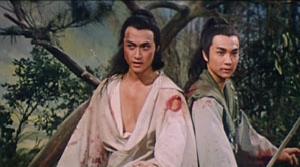
Last Hurrah for Chivalry (John Woo, 1978)
Cantonese Title: Hao xia
John Woo reached his directorial peaks during the late eighties and the early nineties when he focused his talents in telling the stories of the misunderstood guns-for-hire set deep within the underbellies of troubled Hong Kong. It is Woo's consistent tackling of themes of bond, honor, brotherhood and loyalty that gave him an instant access to the international circuit. Coupled with that, Woo understands cinema, the way colors and movements are utilized to enunciate emotions. Last Hurrah for Chivalry, directed by John Woo in 1978, did not use guns or urban settings. Its characters do not don leather jackets and do not smoke cigarettes. Instead, swords, poles and fists are the weapons of choice, and the carriers of such weapons are long-haired heroes sipping Chinese wine as they struggle to outlive a violent rumble.
Essentially, Last Hurrah for Chivalry is a tale of revenge. Inherent in the tale are the themes of friendship and loyalty. Kao (Lau Kong), out of vengeance, wants to kill his family's murderer, Pai (Lee Hoi San), an evil kung fu master who frequently maims and dismembers his students during his daily kung fu exercises. Kao, however, is a weakling, and therefore, devises a plan to attract famous swordsman Chang (Wei Pai), who gave up sword-fighting to take care of his sick mother, to his cause. Kao befriends Chang, and Chang, being the gullible brute, falls for it and promises to avenge Kao's family. Chang develops a mysterious friendship with fellow swordsman Green (Damian Lau), and the two storm Pai's mansion to do Kao's bidding, not knowing that Kao has grander and more evil plans brewing inside his mind.
The plot is simple and takes its cue from the different Shaw Brothers and Cathay kung fu films that went before it. However, the story, written by Woo, is curiously lacking female characters. Aside from the supposed love interest of Green, a kindhearted courtesan who pleads Green to withdraw from his swordsman-for-hire profession, the film is devoid of any feminine representations. Such weakness for developing female characters is evident in Woo who foregos portraying realistic and complete romantic relationships to flesh out the complexities of male bonding. It is noteworthy that Woo doesn't build his characters' relationships through small talk or conversations but through the numerous staged fights. Truly, Woo's philosophy that true friendship is ushered in times of need, where the threat of death is eminent, is a focal point of Last Hurrah for Chivalry.
The two heroes of the film, Chang and Green, are prototypes of the many violent yet morally upright heroes of Woo's later films. Simplistic in characterization and drawing their personalities from oft-used stereotypes, the two heroes aren't very intriguing. The mastermind of the evil plans, Kao the weakly academician, is the one true interesting character of the film. His immoral maneuverings, his snakely charms, his undying insistence on vengeance, marks him as a villain of complexity. During the final battle, after the many murders that is caused by his brutal treachery, he is portrayed as no longer human but is masked in deathly pale make-up, donning his former master's garb but seems to unfitting that he looks more like a vampire rather than a kung fu master, and has a mysterious ability to become invisible and to take flight. It is such corruption that transforms a man of former credibility (during the earlier scenes, you'd still be convinced that Kao has legit rationale) into a monster that is devoid of any humanity.
Last Hurrah for Chivalry does not disappoint in the action department. Woo has a competent understanding on how action scenes are filmed. He acknowledges the fact that these action scenes should be exquisitely choreographed and more importantly, these exquisite action choreography should be captured without any impediments. Woo being a trainee under legendary director Cheng Cheh, Last Hurrah for Chivalry feels like his thesis work. If that is so, it is indubitable that Woo passed with flying colors.







wm.jpg)
























.png)



No comments:
Post a Comment